Comparing Leadership and Management Roles at Marks & Spencer: A Report
VerifiedAdded on 2021/01/02
|16
|4895
|242
Report
AI Summary
This report provides a comprehensive analysis of leadership and management practices at Marks & Spencer (M&S). It begins by differentiating between the roles of leaders and managers, highlighting their respective aims, approaches, styles, and decision-making processes within the company. The report then delves into the application of Henri Fayol's management theory, outlining the functions of managers in planning, organizing, commanding, coordinating, and controlling business operations, and how leaders and managers respond to various situational concepts such as eco-friendly environments and employee requests. Furthermore, the report explores different leadership theories, including situational leadership, systems leadership, and contingency theory, with a focus on Fiedler’s Contingency Theory and Path-Goal Theory, and how these theories influence leadership effectiveness within the retail environment. The report also includes an introduction about ALDI, the similarities and differences between a leader and a manager, and some external key factors that impact on its operational activities.
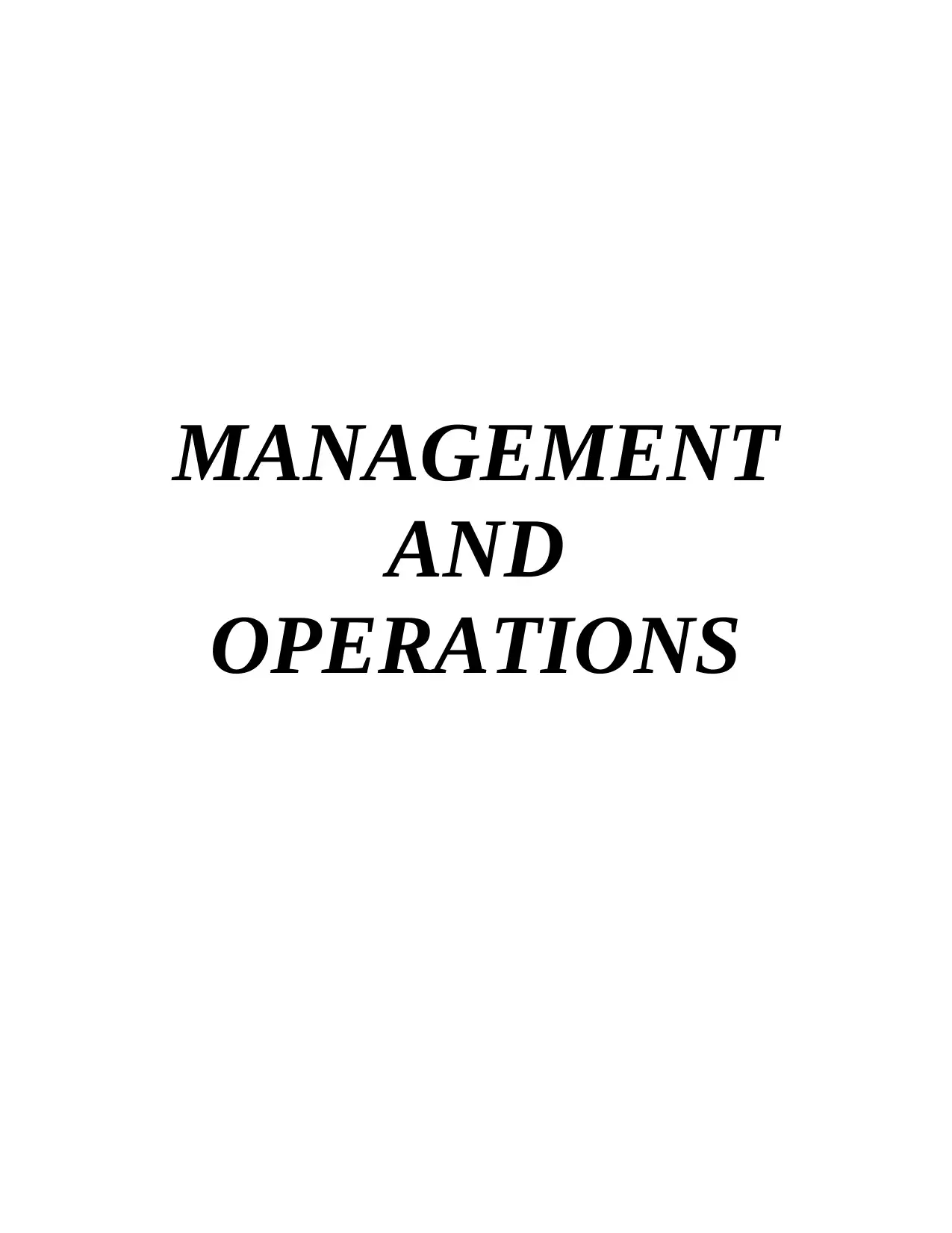
MANAGEMENT
AND
OPERATIONS
AND
OPERATIONS
Paraphrase This Document
Need a fresh take? Get an instant paraphrase of this document with our AI Paraphraser
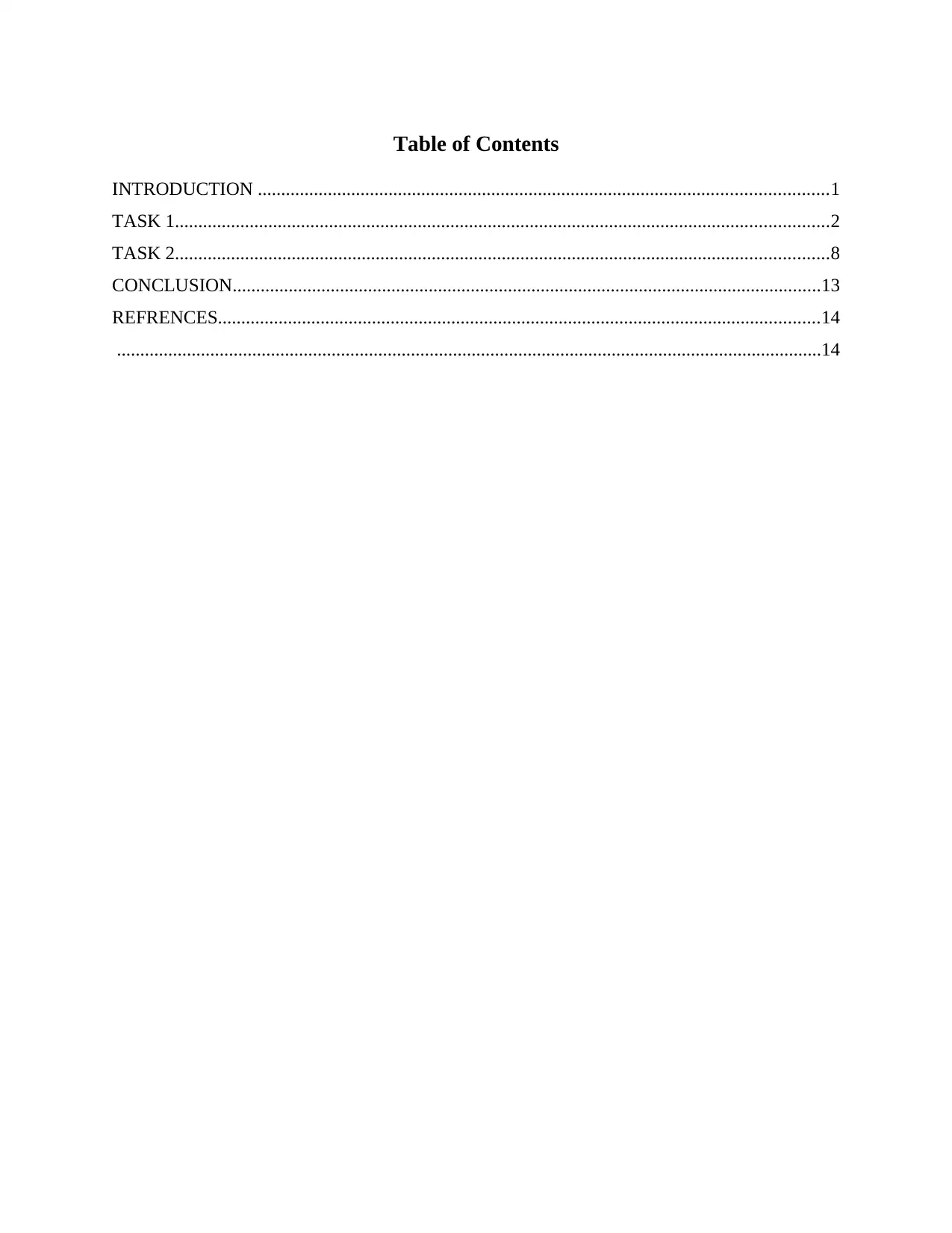
Table of Contents
INTRODUCTION ..........................................................................................................................1
TASK 1............................................................................................................................................2
TASK 2............................................................................................................................................8
CONCLUSION..............................................................................................................................13
REFRENCES.................................................................................................................................14
.......................................................................................................................................................14
INTRODUCTION ..........................................................................................................................1
TASK 1............................................................................................................................................2
TASK 2............................................................................................................................................8
CONCLUSION..............................................................................................................................13
REFRENCES.................................................................................................................................14
.......................................................................................................................................................14
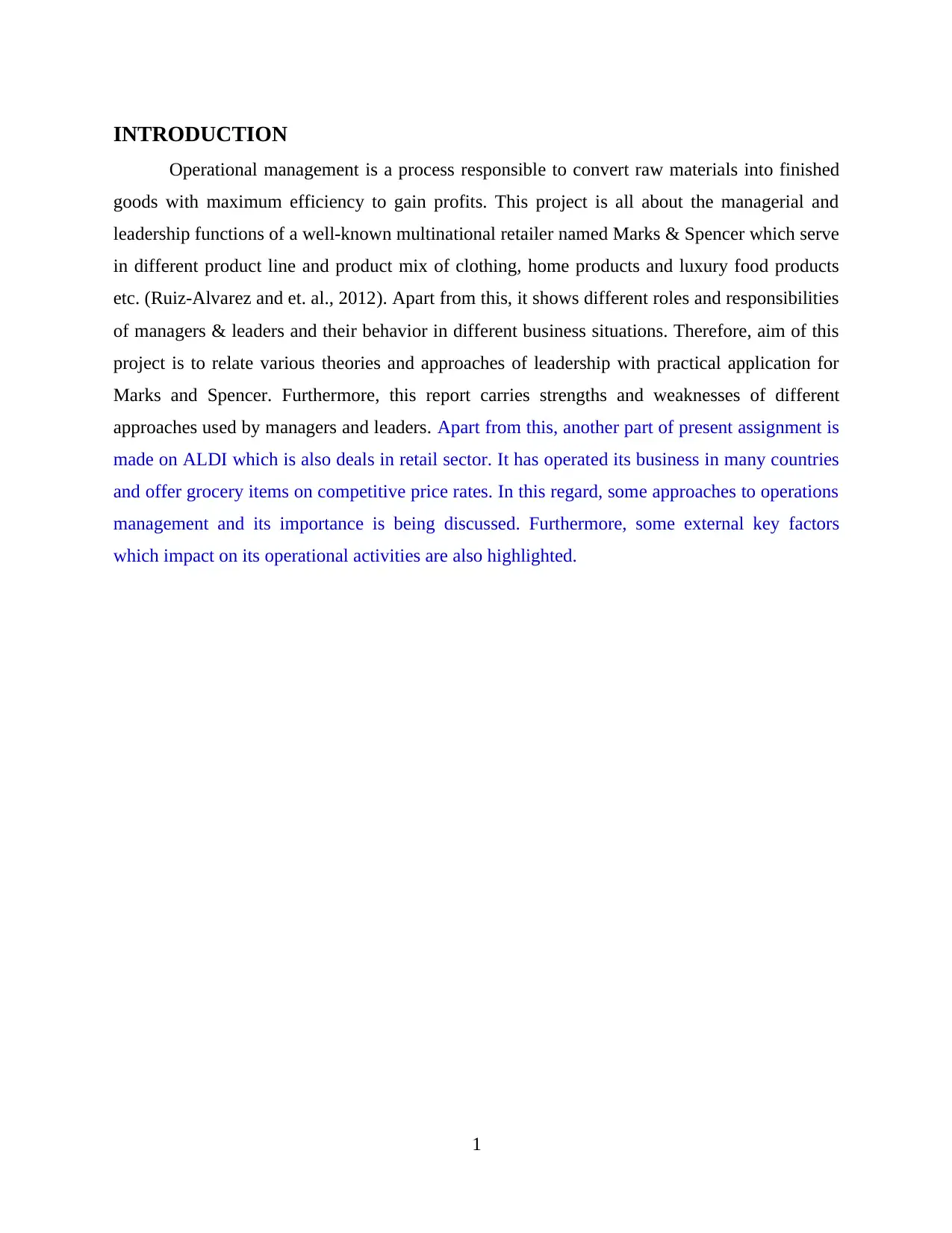
INTRODUCTION
Operational management is a process responsible to convert raw materials into finished
goods with maximum efficiency to gain profits. This project is all about the managerial and
leadership functions of a well-known multinational retailer named Marks & Spencer which serve
in different product line and product mix of clothing, home products and luxury food products
etc. (Ruiz-Alvarez and et. al., 2012). Apart from this, it shows different roles and responsibilities
of managers & leaders and their behavior in different business situations. Therefore, aim of this
project is to relate various theories and approaches of leadership with practical application for
Marks and Spencer. Furthermore, this report carries strengths and weaknesses of different
approaches used by managers and leaders. Apart from this, another part of present assignment is
made on ALDI which is also deals in retail sector. It has operated its business in many countries
and offer grocery items on competitive price rates. In this regard, some approaches to operations
management and its importance is being discussed. Furthermore, some external key factors
which impact on its operational activities are also highlighted.
1
Operational management is a process responsible to convert raw materials into finished
goods with maximum efficiency to gain profits. This project is all about the managerial and
leadership functions of a well-known multinational retailer named Marks & Spencer which serve
in different product line and product mix of clothing, home products and luxury food products
etc. (Ruiz-Alvarez and et. al., 2012). Apart from this, it shows different roles and responsibilities
of managers & leaders and their behavior in different business situations. Therefore, aim of this
project is to relate various theories and approaches of leadership with practical application for
Marks and Spencer. Furthermore, this report carries strengths and weaknesses of different
approaches used by managers and leaders. Apart from this, another part of present assignment is
made on ALDI which is also deals in retail sector. It has operated its business in many countries
and offer grocery items on competitive price rates. In this regard, some approaches to operations
management and its importance is being discussed. Furthermore, some external key factors
which impact on its operational activities are also highlighted.
1
⊘ This is a preview!⊘
Do you want full access?
Subscribe today to unlock all pages.

Trusted by 1+ million students worldwide
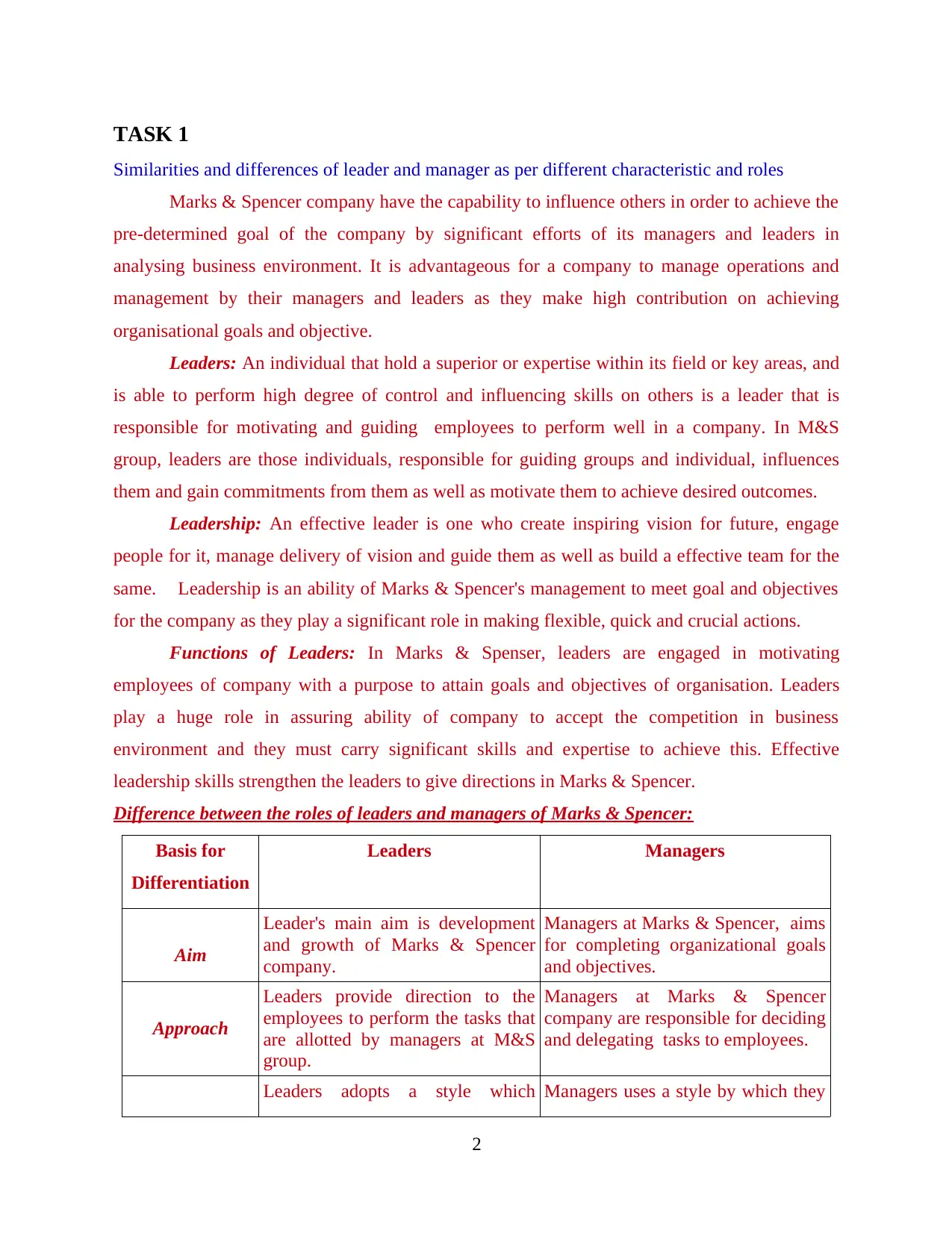
TASK 1
Similarities and differences of leader and manager as per different characteristic and roles
Marks & Spencer company have the capability to influence others in order to achieve the
pre-determined goal of the company by significant efforts of its managers and leaders in
analysing business environment. It is advantageous for a company to manage operations and
management by their managers and leaders as they make high contribution on achieving
organisational goals and objective.
Leaders: An individual that hold a superior or expertise within its field or key areas, and
is able to perform high degree of control and influencing skills on others is a leader that is
responsible for motivating and guiding employees to perform well in a company. In M&S
group, leaders are those individuals, responsible for guiding groups and individual, influences
them and gain commitments from them as well as motivate them to achieve desired outcomes.
Leadership: An effective leader is one who create inspiring vision for future, engage
people for it, manage delivery of vision and guide them as well as build a effective team for the
same. Leadership is an ability of Marks & Spencer's management to meet goal and objectives
for the company as they play a significant role in making flexible, quick and crucial actions.
Functions of Leaders: In Marks & Spenser, leaders are engaged in motivating
employees of company with a purpose to attain goals and objectives of organisation. Leaders
play a huge role in assuring ability of company to accept the competition in business
environment and they must carry significant skills and expertise to achieve this. Effective
leadership skills strengthen the leaders to give directions in Marks & Spencer.
Difference between the roles of leaders and managers of Marks & Spencer:
Basis for
Differentiation
Leaders Managers
Aim
Leader's main aim is development
and growth of Marks & Spencer
company.
Managers at Marks & Spencer, aims
for completing organizational goals
and objectives.
Approach
Leaders provide direction to the
employees to perform the tasks that
are allotted by managers at M&S
group.
Managers at Marks & Spencer
company are responsible for deciding
and delegating tasks to employees.
Leaders adopts a style which Managers uses a style by which they
2
Similarities and differences of leader and manager as per different characteristic and roles
Marks & Spencer company have the capability to influence others in order to achieve the
pre-determined goal of the company by significant efforts of its managers and leaders in
analysing business environment. It is advantageous for a company to manage operations and
management by their managers and leaders as they make high contribution on achieving
organisational goals and objective.
Leaders: An individual that hold a superior or expertise within its field or key areas, and
is able to perform high degree of control and influencing skills on others is a leader that is
responsible for motivating and guiding employees to perform well in a company. In M&S
group, leaders are those individuals, responsible for guiding groups and individual, influences
them and gain commitments from them as well as motivate them to achieve desired outcomes.
Leadership: An effective leader is one who create inspiring vision for future, engage
people for it, manage delivery of vision and guide them as well as build a effective team for the
same. Leadership is an ability of Marks & Spencer's management to meet goal and objectives
for the company as they play a significant role in making flexible, quick and crucial actions.
Functions of Leaders: In Marks & Spenser, leaders are engaged in motivating
employees of company with a purpose to attain goals and objectives of organisation. Leaders
play a huge role in assuring ability of company to accept the competition in business
environment and they must carry significant skills and expertise to achieve this. Effective
leadership skills strengthen the leaders to give directions in Marks & Spencer.
Difference between the roles of leaders and managers of Marks & Spencer:
Basis for
Differentiation
Leaders Managers
Aim
Leader's main aim is development
and growth of Marks & Spencer
company.
Managers at Marks & Spencer, aims
for completing organizational goals
and objectives.
Approach
Leaders provide direction to the
employees to perform the tasks that
are allotted by managers at M&S
group.
Managers at Marks & Spencer
company are responsible for deciding
and delegating tasks to employees.
Leaders adopts a style which Managers uses a style by which they
2
Paraphrase This Document
Need a fresh take? Get an instant paraphrase of this document with our AI Paraphraser
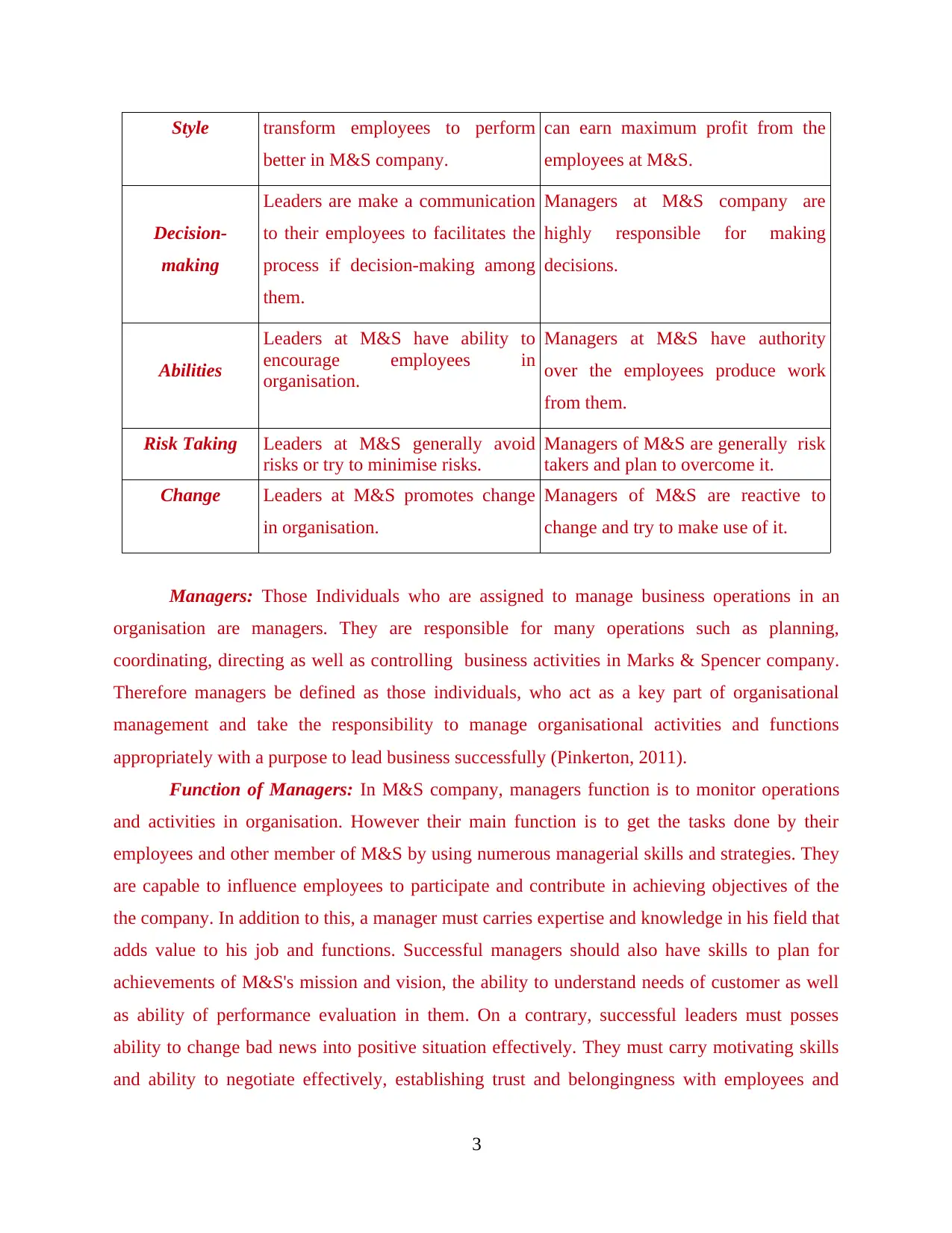
Style transform employees to perform
better in M&S company.
can earn maximum profit from the
employees at M&S.
Decision-
making
Leaders are make a communication
to their employees to facilitates the
process if decision-making among
them.
Managers at M&S company are
highly responsible for making
decisions.
Abilities
Leaders at M&S have ability to
encourage employees in
organisation.
Managers at M&S have authority
over the employees produce work
from them.
Risk Taking Leaders at M&S generally avoid
risks or try to minimise risks.
Managers of M&S are generally risk
takers and plan to overcome it.
Change Leaders at M&S promotes change
in organisation.
Managers of M&S are reactive to
change and try to make use of it.
Managers: Those Individuals who are assigned to manage business operations in an
organisation are managers. They are responsible for many operations such as planning,
coordinating, directing as well as controlling business activities in Marks & Spencer company.
Therefore managers be defined as those individuals, who act as a key part of organisational
management and take the responsibility to manage organisational activities and functions
appropriately with a purpose to lead business successfully (Pinkerton, 2011).
Function of Managers: In M&S company, managers function is to monitor operations
and activities in organisation. However their main function is to get the tasks done by their
employees and other member of M&S by using numerous managerial skills and strategies. They
are capable to influence employees to participate and contribute in achieving objectives of the
the company. In addition to this, a manager must carries expertise and knowledge in his field that
adds value to his job and functions. Successful managers should also have skills to plan for
achievements of M&S's mission and vision, the ability to understand needs of customer as well
as ability of performance evaluation in them. On a contrary, successful leaders must posses
ability to change bad news into positive situation effectively. They must carry motivating skills
and ability to negotiate effectively, establishing trust and belongingness with employees and
3
better in M&S company.
can earn maximum profit from the
employees at M&S.
Decision-
making
Leaders are make a communication
to their employees to facilitates the
process if decision-making among
them.
Managers at M&S company are
highly responsible for making
decisions.
Abilities
Leaders at M&S have ability to
encourage employees in
organisation.
Managers at M&S have authority
over the employees produce work
from them.
Risk Taking Leaders at M&S generally avoid
risks or try to minimise risks.
Managers of M&S are generally risk
takers and plan to overcome it.
Change Leaders at M&S promotes change
in organisation.
Managers of M&S are reactive to
change and try to make use of it.
Managers: Those Individuals who are assigned to manage business operations in an
organisation are managers. They are responsible for many operations such as planning,
coordinating, directing as well as controlling business activities in Marks & Spencer company.
Therefore managers be defined as those individuals, who act as a key part of organisational
management and take the responsibility to manage organisational activities and functions
appropriately with a purpose to lead business successfully (Pinkerton, 2011).
Function of Managers: In M&S company, managers function is to monitor operations
and activities in organisation. However their main function is to get the tasks done by their
employees and other member of M&S by using numerous managerial skills and strategies. They
are capable to influence employees to participate and contribute in achieving objectives of the
the company. In addition to this, a manager must carries expertise and knowledge in his field that
adds value to his job and functions. Successful managers should also have skills to plan for
achievements of M&S's mission and vision, the ability to understand needs of customer as well
as ability of performance evaluation in them. On a contrary, successful leaders must posses
ability to change bad news into positive situation effectively. They must carry motivating skills
and ability to negotiate effectively, establishing trust and belongingness with employees and
3
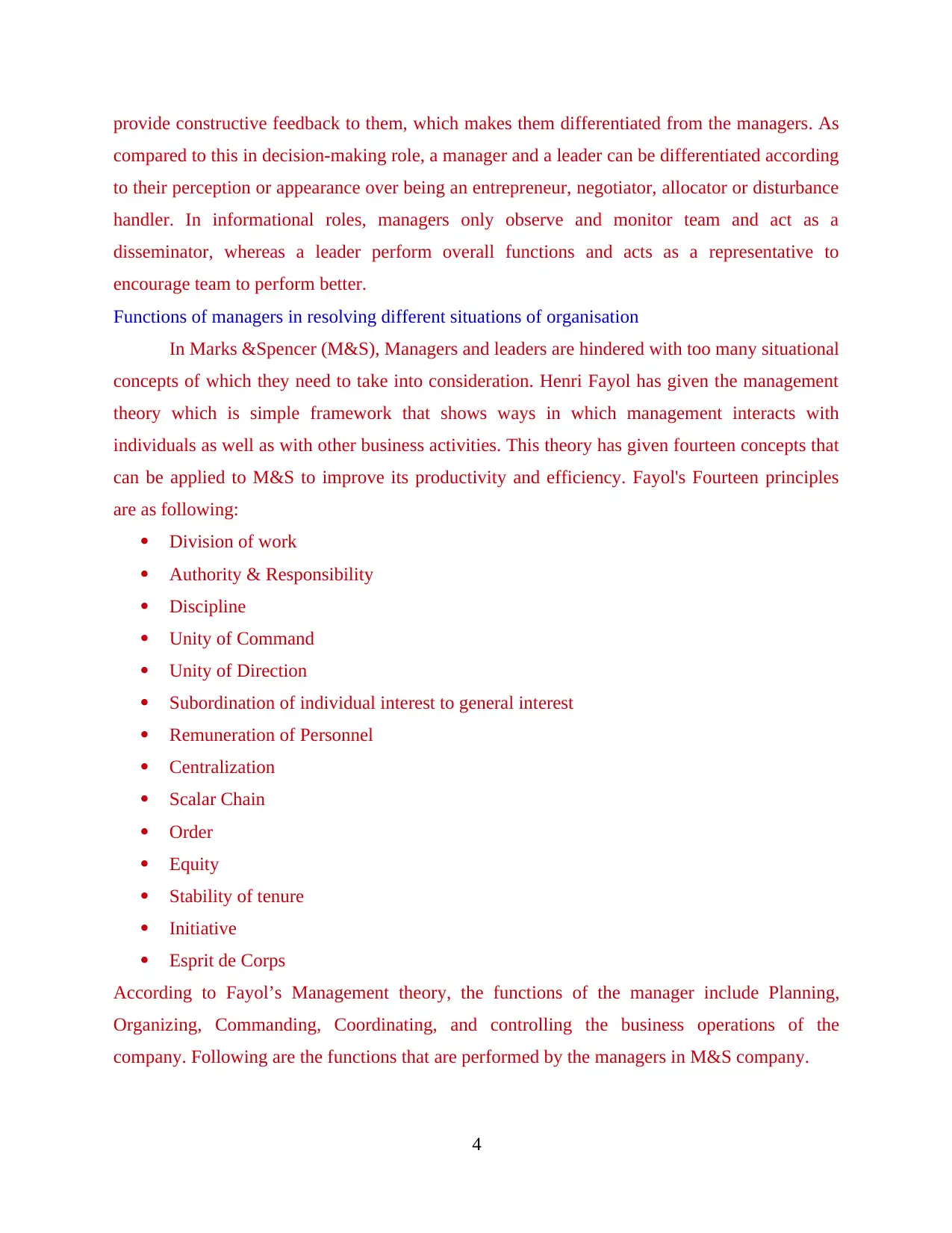
provide constructive feedback to them, which makes them differentiated from the managers. As
compared to this in decision-making role, a manager and a leader can be differentiated according
to their perception or appearance over being an entrepreneur, negotiator, allocator or disturbance
handler. In informational roles, managers only observe and monitor team and act as a
disseminator, whereas a leader perform overall functions and acts as a representative to
encourage team to perform better.
Functions of managers in resolving different situations of organisation
In Marks &Spencer (M&S), Managers and leaders are hindered with too many situational
concepts of which they need to take into consideration. Henri Fayol has given the management
theory which is simple framework that shows ways in which management interacts with
individuals as well as with other business activities. This theory has given fourteen concepts that
can be applied to M&S to improve its productivity and efficiency. Fayol's Fourteen principles
are as following:
Division of work
Authority & Responsibility
Discipline
Unity of Command
Unity of Direction
Subordination of individual interest to general interest
Remuneration of Personnel
Centralization
Scalar Chain
Order
Equity
Stability of tenure
Initiative
Esprit de Corps
According to Fayol’s Management theory, the functions of the manager include Planning,
Organizing, Commanding, Coordinating, and controlling the business operations of the
company. Following are the functions that are performed by the managers in M&S company.
4
compared to this in decision-making role, a manager and a leader can be differentiated according
to their perception or appearance over being an entrepreneur, negotiator, allocator or disturbance
handler. In informational roles, managers only observe and monitor team and act as a
disseminator, whereas a leader perform overall functions and acts as a representative to
encourage team to perform better.
Functions of managers in resolving different situations of organisation
In Marks &Spencer (M&S), Managers and leaders are hindered with too many situational
concepts of which they need to take into consideration. Henri Fayol has given the management
theory which is simple framework that shows ways in which management interacts with
individuals as well as with other business activities. This theory has given fourteen concepts that
can be applied to M&S to improve its productivity and efficiency. Fayol's Fourteen principles
are as following:
Division of work
Authority & Responsibility
Discipline
Unity of Command
Unity of Direction
Subordination of individual interest to general interest
Remuneration of Personnel
Centralization
Scalar Chain
Order
Equity
Stability of tenure
Initiative
Esprit de Corps
According to Fayol’s Management theory, the functions of the manager include Planning,
Organizing, Commanding, Coordinating, and controlling the business operations of the
company. Following are the functions that are performed by the managers in M&S company.
4
⊘ This is a preview!⊘
Do you want full access?
Subscribe today to unlock all pages.

Trusted by 1+ million students worldwide
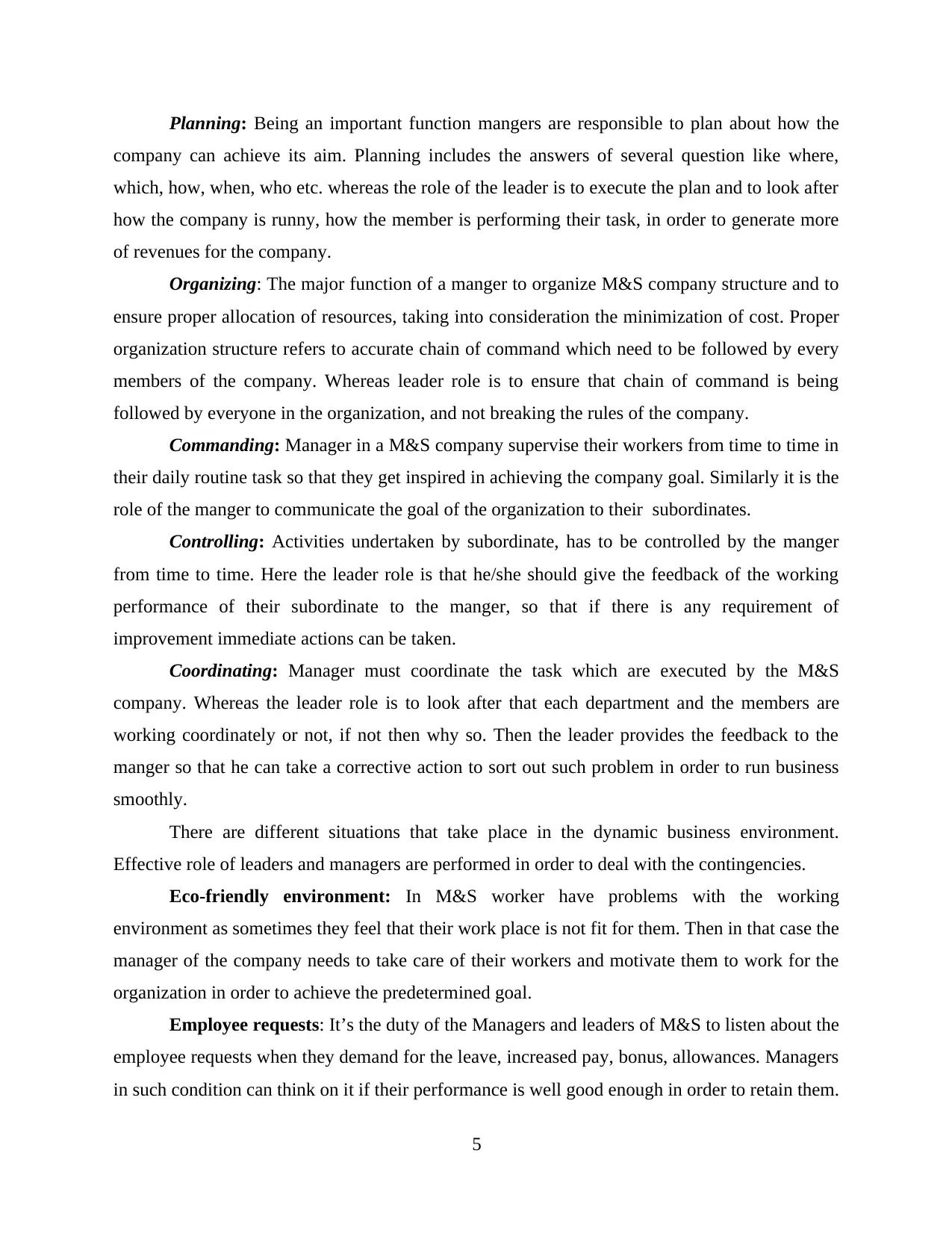
Planning: Being an important function mangers are responsible to plan about how the
company can achieve its aim. Planning includes the answers of several question like where,
which, how, when, who etc. whereas the role of the leader is to execute the plan and to look after
how the company is runny, how the member is performing their task, in order to generate more
of revenues for the company.
Organizing: The major function of a manger to organize M&S company structure and to
ensure proper allocation of resources, taking into consideration the minimization of cost. Proper
organization structure refers to accurate chain of command which need to be followed by every
members of the company. Whereas leader role is to ensure that chain of command is being
followed by everyone in the organization, and not breaking the rules of the company.
Commanding: Manager in a M&S company supervise their workers from time to time in
their daily routine task so that they get inspired in achieving the company goal. Similarly it is the
role of the manger to communicate the goal of the organization to their subordinates.
Controlling: Activities undertaken by subordinate, has to be controlled by the manger
from time to time. Here the leader role is that he/she should give the feedback of the working
performance of their subordinate to the manger, so that if there is any requirement of
improvement immediate actions can be taken.
Coordinating: Manager must coordinate the task which are executed by the M&S
company. Whereas the leader role is to look after that each department and the members are
working coordinately or not, if not then why so. Then the leader provides the feedback to the
manger so that he can take a corrective action to sort out such problem in order to run business
smoothly.
There are different situations that take place in the dynamic business environment.
Effective role of leaders and managers are performed in order to deal with the contingencies.
Eco-friendly environment: In M&S worker have problems with the working
environment as sometimes they feel that their work place is not fit for them. Then in that case the
manager of the company needs to take care of their workers and motivate them to work for the
organization in order to achieve the predetermined goal.
Employee requests: It’s the duty of the Managers and leaders of M&S to listen about the
employee requests when they demand for the leave, increased pay, bonus, allowances. Managers
in such condition can think on it if their performance is well good enough in order to retain them.
5
company can achieve its aim. Planning includes the answers of several question like where,
which, how, when, who etc. whereas the role of the leader is to execute the plan and to look after
how the company is runny, how the member is performing their task, in order to generate more
of revenues for the company.
Organizing: The major function of a manger to organize M&S company structure and to
ensure proper allocation of resources, taking into consideration the minimization of cost. Proper
organization structure refers to accurate chain of command which need to be followed by every
members of the company. Whereas leader role is to ensure that chain of command is being
followed by everyone in the organization, and not breaking the rules of the company.
Commanding: Manager in a M&S company supervise their workers from time to time in
their daily routine task so that they get inspired in achieving the company goal. Similarly it is the
role of the manger to communicate the goal of the organization to their subordinates.
Controlling: Activities undertaken by subordinate, has to be controlled by the manger
from time to time. Here the leader role is that he/she should give the feedback of the working
performance of their subordinate to the manger, so that if there is any requirement of
improvement immediate actions can be taken.
Coordinating: Manager must coordinate the task which are executed by the M&S
company. Whereas the leader role is to look after that each department and the members are
working coordinately or not, if not then why so. Then the leader provides the feedback to the
manger so that he can take a corrective action to sort out such problem in order to run business
smoothly.
There are different situations that take place in the dynamic business environment.
Effective role of leaders and managers are performed in order to deal with the contingencies.
Eco-friendly environment: In M&S worker have problems with the working
environment as sometimes they feel that their work place is not fit for them. Then in that case the
manager of the company needs to take care of their workers and motivate them to work for the
organization in order to achieve the predetermined goal.
Employee requests: It’s the duty of the Managers and leaders of M&S to listen about the
employee requests when they demand for the leave, increased pay, bonus, allowances. Managers
in such condition can think on it if their performance is well good enough in order to retain them.
5
Paraphrase This Document
Need a fresh take? Get an instant paraphrase of this document with our AI Paraphraser
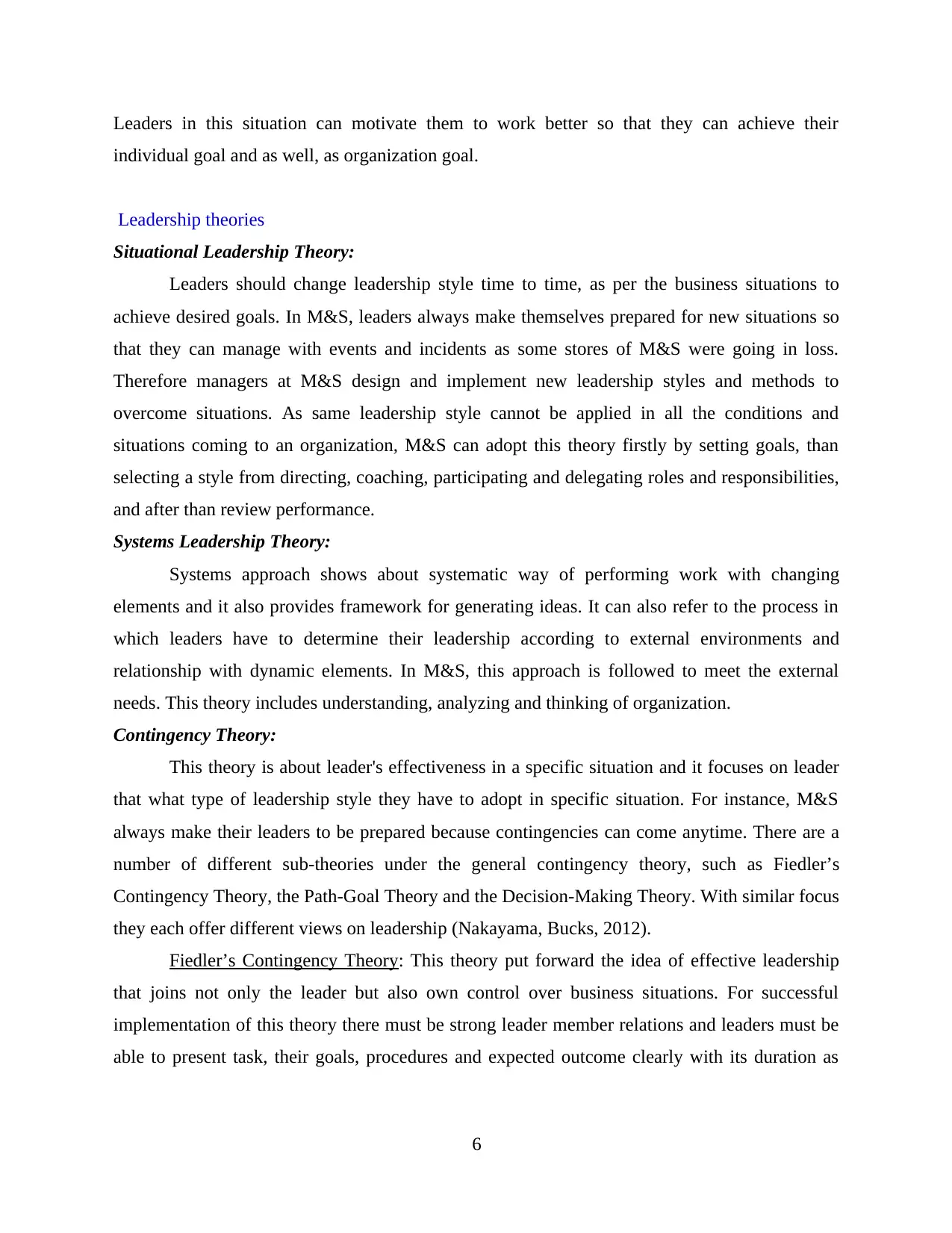
Leaders in this situation can motivate them to work better so that they can achieve their
individual goal and as well, as organization goal.
Leadership theories
Situational Leadership Theory:
Leaders should change leadership style time to time, as per the business situations to
achieve desired goals. In M&S, leaders always make themselves prepared for new situations so
that they can manage with events and incidents as some stores of M&S were going in loss.
Therefore managers at M&S design and implement new leadership styles and methods to
overcome situations. As same leadership style cannot be applied in all the conditions and
situations coming to an organization, M&S can adopt this theory firstly by setting goals, than
selecting a style from directing, coaching, participating and delegating roles and responsibilities,
and after than review performance.
Systems Leadership Theory:
Systems approach shows about systematic way of performing work with changing
elements and it also provides framework for generating ideas. It can also refer to the process in
which leaders have to determine their leadership according to external environments and
relationship with dynamic elements. In M&S, this approach is followed to meet the external
needs. This theory includes understanding, analyzing and thinking of organization.
Contingency Theory:
This theory is about leader's effectiveness in a specific situation and it focuses on leader
that what type of leadership style they have to adopt in specific situation. For instance, M&S
always make their leaders to be prepared because contingencies can come anytime. There are a
number of different sub-theories under the general contingency theory, such as Fiedler’s
Contingency Theory, the Path-Goal Theory and the Decision-Making Theory. With similar focus
they each offer different views on leadership (Nakayama, Bucks, 2012).
Fiedler’s Contingency Theory: This theory put forward the idea of effective leadership
that joins not only the leader but also own control over business situations. For successful
implementation of this theory there must be strong leader member relations and leaders must be
able to present task, their goals, procedures and expected outcome clearly with its duration as
6
individual goal and as well, as organization goal.
Leadership theories
Situational Leadership Theory:
Leaders should change leadership style time to time, as per the business situations to
achieve desired goals. In M&S, leaders always make themselves prepared for new situations so
that they can manage with events and incidents as some stores of M&S were going in loss.
Therefore managers at M&S design and implement new leadership styles and methods to
overcome situations. As same leadership style cannot be applied in all the conditions and
situations coming to an organization, M&S can adopt this theory firstly by setting goals, than
selecting a style from directing, coaching, participating and delegating roles and responsibilities,
and after than review performance.
Systems Leadership Theory:
Systems approach shows about systematic way of performing work with changing
elements and it also provides framework for generating ideas. It can also refer to the process in
which leaders have to determine their leadership according to external environments and
relationship with dynamic elements. In M&S, this approach is followed to meet the external
needs. This theory includes understanding, analyzing and thinking of organization.
Contingency Theory:
This theory is about leader's effectiveness in a specific situation and it focuses on leader
that what type of leadership style they have to adopt in specific situation. For instance, M&S
always make their leaders to be prepared because contingencies can come anytime. There are a
number of different sub-theories under the general contingency theory, such as Fiedler’s
Contingency Theory, the Path-Goal Theory and the Decision-Making Theory. With similar focus
they each offer different views on leadership (Nakayama, Bucks, 2012).
Fiedler’s Contingency Theory: This theory put forward the idea of effective leadership
that joins not only the leader but also own control over business situations. For successful
implementation of this theory there must be strong leader member relations and leaders must be
able to present task, their goals, procedures and expected outcome clearly with its duration as
6
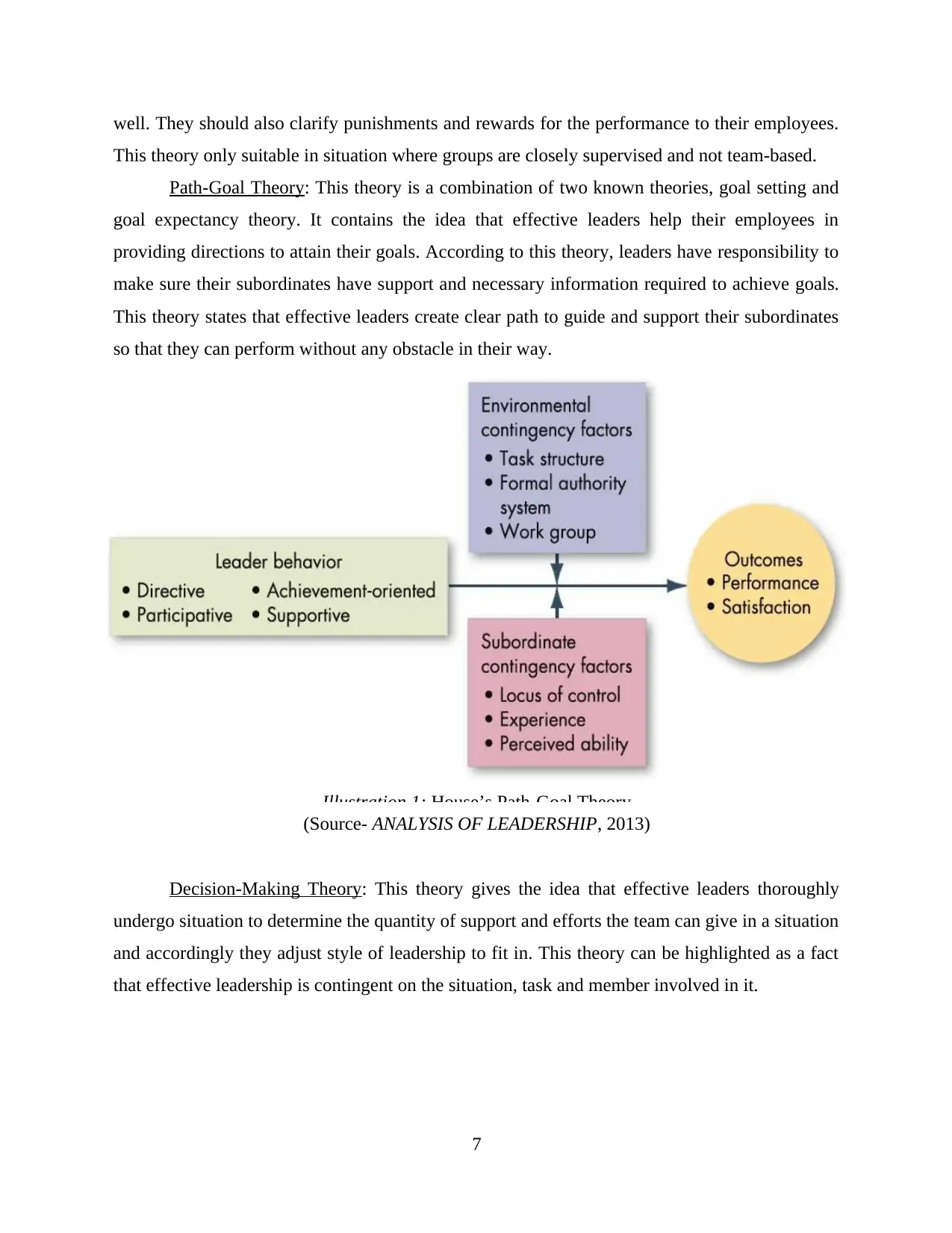
well. They should also clarify punishments and rewards for the performance to their employees.
This theory only suitable in situation where groups are closely supervised and not team-based.
Path-Goal Theory: This theory is a combination of two known theories, goal setting and
goal expectancy theory. It contains the idea that effective leaders help their employees in
providing directions to attain their goals. According to this theory, leaders have responsibility to
make sure their subordinates have support and necessary information required to achieve goals.
This theory states that effective leaders create clear path to guide and support their subordinates
so that they can perform without any obstacle in their way.
(Source- ANALYSIS OF LEADERSHIP, 2013)
Decision-Making Theory: This theory gives the idea that effective leaders thoroughly
undergo situation to determine the quantity of support and efforts the team can give in a situation
and accordingly they adjust style of leadership to fit in. This theory can be highlighted as a fact
that effective leadership is contingent on the situation, task and member involved in it.
7
Illustration 1: House’s Path-Goal Theory
This theory only suitable in situation where groups are closely supervised and not team-based.
Path-Goal Theory: This theory is a combination of two known theories, goal setting and
goal expectancy theory. It contains the idea that effective leaders help their employees in
providing directions to attain their goals. According to this theory, leaders have responsibility to
make sure their subordinates have support and necessary information required to achieve goals.
This theory states that effective leaders create clear path to guide and support their subordinates
so that they can perform without any obstacle in their way.
(Source- ANALYSIS OF LEADERSHIP, 2013)
Decision-Making Theory: This theory gives the idea that effective leaders thoroughly
undergo situation to determine the quantity of support and efforts the team can give in a situation
and accordingly they adjust style of leadership to fit in. This theory can be highlighted as a fact
that effective leadership is contingent on the situation, task and member involved in it.
7
Illustration 1: House’s Path-Goal Theory
⊘ This is a preview!⊘
Do you want full access?
Subscribe today to unlock all pages.

Trusted by 1+ million students worldwide
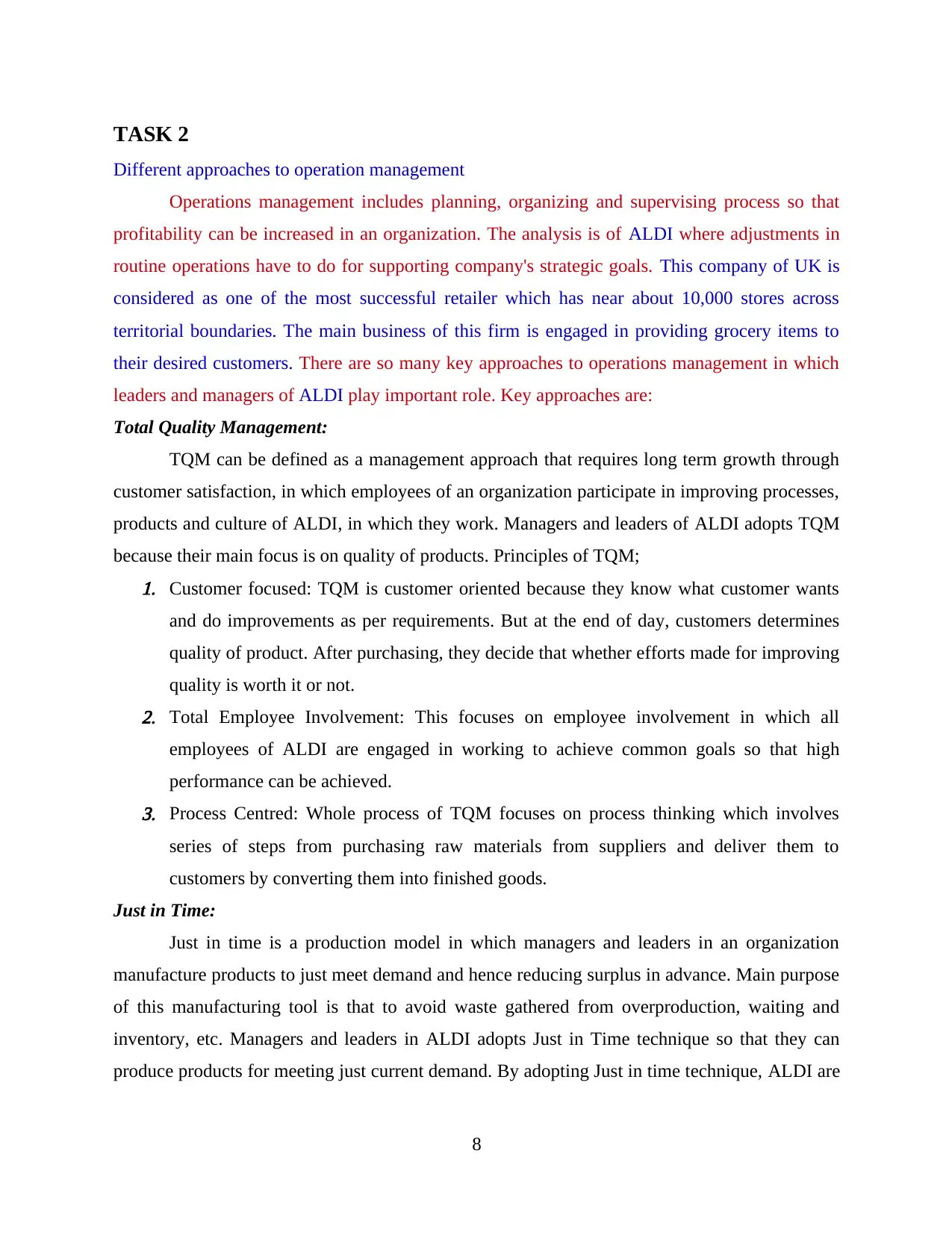
TASK 2
Different approaches to operation management
Operations management includes planning, organizing and supervising process so that
profitability can be increased in an organization. The analysis is of ALDI where adjustments in
routine operations have to do for supporting company's strategic goals. This company of UK is
considered as one of the most successful retailer which has near about 10,000 stores across
territorial boundaries. The main business of this firm is engaged in providing grocery items to
their desired customers. There are so many key approaches to operations management in which
leaders and managers of ALDI play important role. Key approaches are:
Total Quality Management:
TQM can be defined as a management approach that requires long term growth through
customer satisfaction, in which employees of an organization participate in improving processes,
products and culture of ALDI, in which they work. Managers and leaders of ALDI adopts TQM
because their main focus is on quality of products. Principles of TQM;1. Customer focused: TQM is customer oriented because they know what customer wants
and do improvements as per requirements. But at the end of day, customers determines
quality of product. After purchasing, they decide that whether efforts made for improving
quality is worth it or not.2. Total Employee Involvement: This focuses on employee involvement in which all
employees of ALDI are engaged in working to achieve common goals so that high
performance can be achieved.3. Process Centred: Whole process of TQM focuses on process thinking which involves
series of steps from purchasing raw materials from suppliers and deliver them to
customers by converting them into finished goods.
Just in Time:
Just in time is a production model in which managers and leaders in an organization
manufacture products to just meet demand and hence reducing surplus in advance. Main purpose
of this manufacturing tool is that to avoid waste gathered from overproduction, waiting and
inventory, etc. Managers and leaders in ALDI adopts Just in Time technique so that they can
produce products for meeting just current demand. By adopting Just in time technique, ALDI are
8
Different approaches to operation management
Operations management includes planning, organizing and supervising process so that
profitability can be increased in an organization. The analysis is of ALDI where adjustments in
routine operations have to do for supporting company's strategic goals. This company of UK is
considered as one of the most successful retailer which has near about 10,000 stores across
territorial boundaries. The main business of this firm is engaged in providing grocery items to
their desired customers. There are so many key approaches to operations management in which
leaders and managers of ALDI play important role. Key approaches are:
Total Quality Management:
TQM can be defined as a management approach that requires long term growth through
customer satisfaction, in which employees of an organization participate in improving processes,
products and culture of ALDI, in which they work. Managers and leaders of ALDI adopts TQM
because their main focus is on quality of products. Principles of TQM;1. Customer focused: TQM is customer oriented because they know what customer wants
and do improvements as per requirements. But at the end of day, customers determines
quality of product. After purchasing, they decide that whether efforts made for improving
quality is worth it or not.2. Total Employee Involvement: This focuses on employee involvement in which all
employees of ALDI are engaged in working to achieve common goals so that high
performance can be achieved.3. Process Centred: Whole process of TQM focuses on process thinking which involves
series of steps from purchasing raw materials from suppliers and deliver them to
customers by converting them into finished goods.
Just in Time:
Just in time is a production model in which managers and leaders in an organization
manufacture products to just meet demand and hence reducing surplus in advance. Main purpose
of this manufacturing tool is that to avoid waste gathered from overproduction, waiting and
inventory, etc. Managers and leaders in ALDI adopts Just in Time technique so that they can
produce products for meeting just current demand. By adopting Just in time technique, ALDI are
8
Paraphrase This Document
Need a fresh take? Get an instant paraphrase of this document with our AI Paraphraser
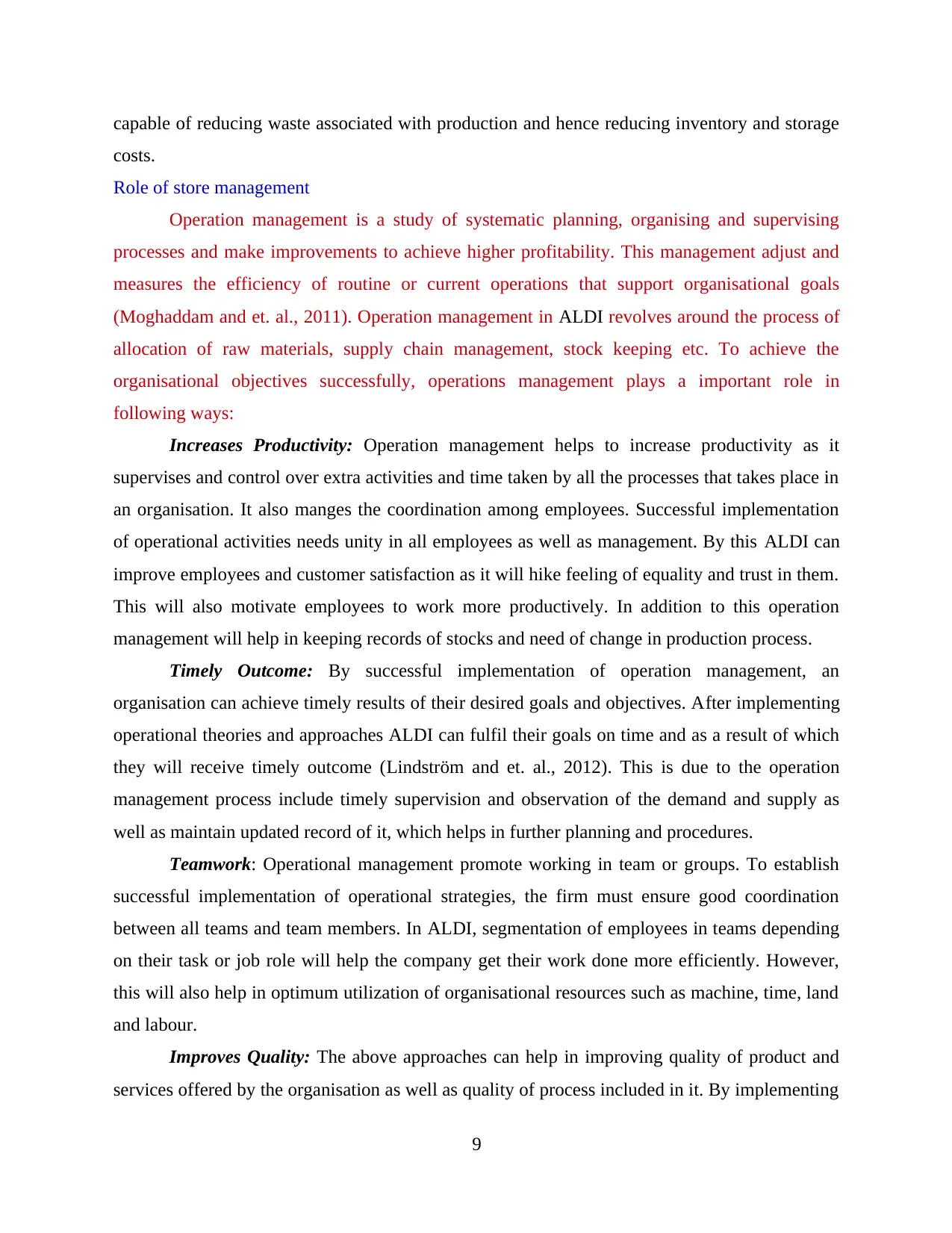
capable of reducing waste associated with production and hence reducing inventory and storage
costs.
Role of store management
Operation management is a study of systematic planning, organising and supervising
processes and make improvements to achieve higher profitability. This management adjust and
measures the efficiency of routine or current operations that support organisational goals
(Moghaddam and et. al., 2011). Operation management in ALDI revolves around the process of
allocation of raw materials, supply chain management, stock keeping etc. To achieve the
organisational objectives successfully, operations management plays a important role in
following ways:
Increases Productivity: Operation management helps to increase productivity as it
supervises and control over extra activities and time taken by all the processes that takes place in
an organisation. It also manges the coordination among employees. Successful implementation
of operational activities needs unity in all employees as well as management. By this ALDI can
improve employees and customer satisfaction as it will hike feeling of equality and trust in them.
This will also motivate employees to work more productively. In addition to this operation
management will help in keeping records of stocks and need of change in production process.
Timely Outcome: By successful implementation of operation management, an
organisation can achieve timely results of their desired goals and objectives. After implementing
operational theories and approaches ALDI can fulfil their goals on time and as a result of which
they will receive timely outcome (Lindström and et. al., 2012). This is due to the operation
management process include timely supervision and observation of the demand and supply as
well as maintain updated record of it, which helps in further planning and procedures.
Teamwork: Operational management promote working in team or groups. To establish
successful implementation of operational strategies, the firm must ensure good coordination
between all teams and team members. In ALDI, segmentation of employees in teams depending
on their task or job role will help the company get their work done more efficiently. However,
this will also help in optimum utilization of organisational resources such as machine, time, land
and labour.
Improves Quality: The above approaches can help in improving quality of product and
services offered by the organisation as well as quality of process included in it. By implementing
9
costs.
Role of store management
Operation management is a study of systematic planning, organising and supervising
processes and make improvements to achieve higher profitability. This management adjust and
measures the efficiency of routine or current operations that support organisational goals
(Moghaddam and et. al., 2011). Operation management in ALDI revolves around the process of
allocation of raw materials, supply chain management, stock keeping etc. To achieve the
organisational objectives successfully, operations management plays a important role in
following ways:
Increases Productivity: Operation management helps to increase productivity as it
supervises and control over extra activities and time taken by all the processes that takes place in
an organisation. It also manges the coordination among employees. Successful implementation
of operational activities needs unity in all employees as well as management. By this ALDI can
improve employees and customer satisfaction as it will hike feeling of equality and trust in them.
This will also motivate employees to work more productively. In addition to this operation
management will help in keeping records of stocks and need of change in production process.
Timely Outcome: By successful implementation of operation management, an
organisation can achieve timely results of their desired goals and objectives. After implementing
operational theories and approaches ALDI can fulfil their goals on time and as a result of which
they will receive timely outcome (Lindström and et. al., 2012). This is due to the operation
management process include timely supervision and observation of the demand and supply as
well as maintain updated record of it, which helps in further planning and procedures.
Teamwork: Operational management promote working in team or groups. To establish
successful implementation of operational strategies, the firm must ensure good coordination
between all teams and team members. In ALDI, segmentation of employees in teams depending
on their task or job role will help the company get their work done more efficiently. However,
this will also help in optimum utilization of organisational resources such as machine, time, land
and labour.
Improves Quality: The above approaches can help in improving quality of product and
services offered by the organisation as well as quality of process included in it. By implementing
9
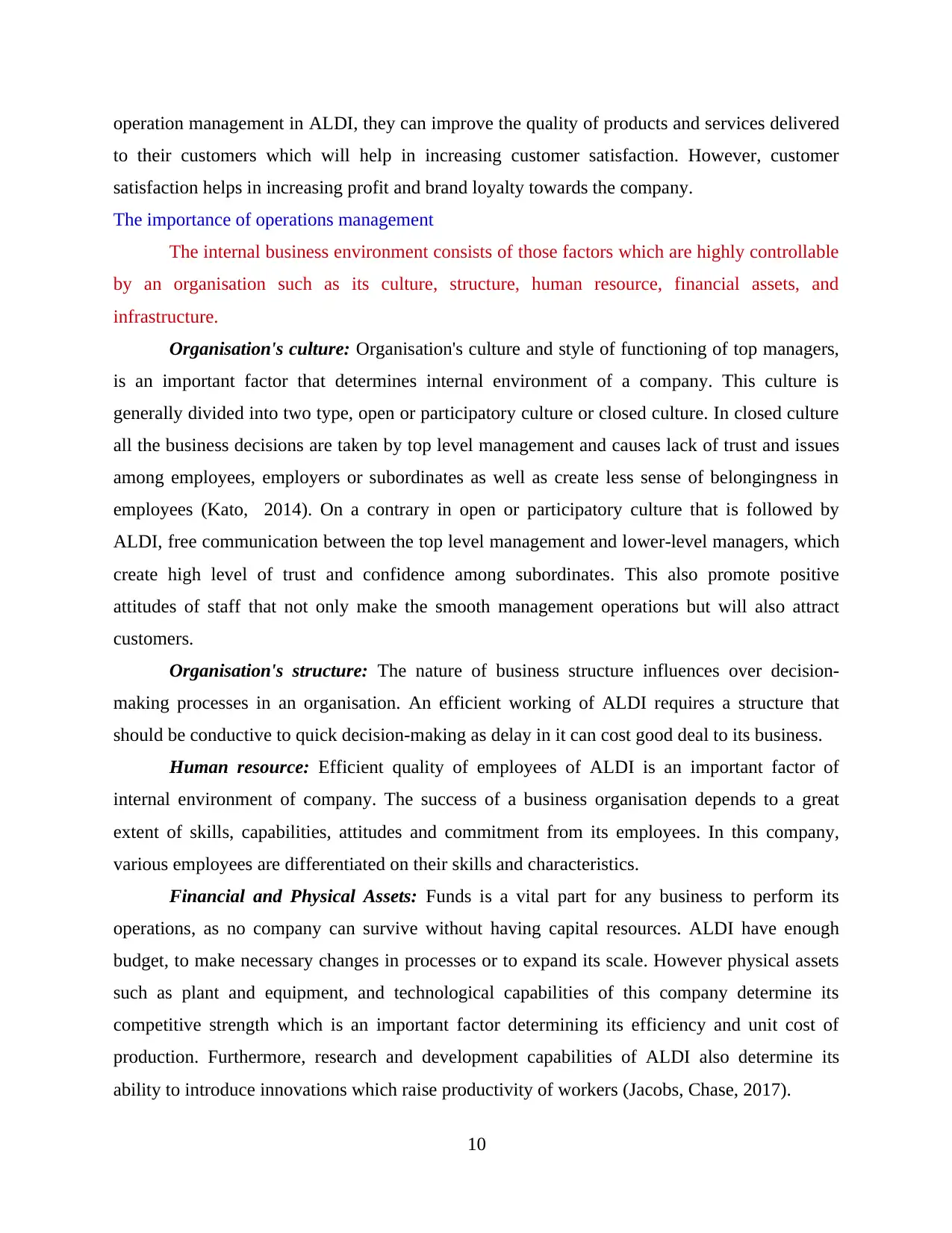
operation management in ALDI, they can improve the quality of products and services delivered
to their customers which will help in increasing customer satisfaction. However, customer
satisfaction helps in increasing profit and brand loyalty towards the company.
The importance of operations management
The internal business environment consists of those factors which are highly controllable
by an organisation such as its culture, structure, human resource, financial assets, and
infrastructure.
Organisation's culture: Organisation's culture and style of functioning of top managers,
is an important factor that determines internal environment of a company. This culture is
generally divided into two type, open or participatory culture or closed culture. In closed culture
all the business decisions are taken by top level management and causes lack of trust and issues
among employees, employers or subordinates as well as create less sense of belongingness in
employees (Kato, 2014). On a contrary in open or participatory culture that is followed by
ALDI, free communication between the top level management and lower-level managers, which
create high level of trust and confidence among subordinates. This also promote positive
attitudes of staff that not only make the smooth management operations but will also attract
customers.
Organisation's structure: The nature of business structure influences over decision-
making processes in an organisation. An efficient working of ALDI requires a structure that
should be conductive to quick decision-making as delay in it can cost good deal to its business.
Human resource: Efficient quality of employees of ALDI is an important factor of
internal environment of company. The success of a business organisation depends to a great
extent of skills, capabilities, attitudes and commitment from its employees. In this company,
various employees are differentiated on their skills and characteristics.
Financial and Physical Assets: Funds is a vital part for any business to perform its
operations, as no company can survive without having capital resources. ALDI have enough
budget, to make necessary changes in processes or to expand its scale. However physical assets
such as plant and equipment, and technological capabilities of this company determine its
competitive strength which is an important factor determining its efficiency and unit cost of
production. Furthermore, research and development capabilities of ALDI also determine its
ability to introduce innovations which raise productivity of workers (Jacobs, Chase, 2017).
10
to their customers which will help in increasing customer satisfaction. However, customer
satisfaction helps in increasing profit and brand loyalty towards the company.
The importance of operations management
The internal business environment consists of those factors which are highly controllable
by an organisation such as its culture, structure, human resource, financial assets, and
infrastructure.
Organisation's culture: Organisation's culture and style of functioning of top managers,
is an important factor that determines internal environment of a company. This culture is
generally divided into two type, open or participatory culture or closed culture. In closed culture
all the business decisions are taken by top level management and causes lack of trust and issues
among employees, employers or subordinates as well as create less sense of belongingness in
employees (Kato, 2014). On a contrary in open or participatory culture that is followed by
ALDI, free communication between the top level management and lower-level managers, which
create high level of trust and confidence among subordinates. This also promote positive
attitudes of staff that not only make the smooth management operations but will also attract
customers.
Organisation's structure: The nature of business structure influences over decision-
making processes in an organisation. An efficient working of ALDI requires a structure that
should be conductive to quick decision-making as delay in it can cost good deal to its business.
Human resource: Efficient quality of employees of ALDI is an important factor of
internal environment of company. The success of a business organisation depends to a great
extent of skills, capabilities, attitudes and commitment from its employees. In this company,
various employees are differentiated on their skills and characteristics.
Financial and Physical Assets: Funds is a vital part for any business to perform its
operations, as no company can survive without having capital resources. ALDI have enough
budget, to make necessary changes in processes or to expand its scale. However physical assets
such as plant and equipment, and technological capabilities of this company determine its
competitive strength which is an important factor determining its efficiency and unit cost of
production. Furthermore, research and development capabilities of ALDI also determine its
ability to introduce innovations which raise productivity of workers (Jacobs, Chase, 2017).
10
⊘ This is a preview!⊘
Do you want full access?
Subscribe today to unlock all pages.

Trusted by 1+ million students worldwide
1 out of 16
Related Documents
Your All-in-One AI-Powered Toolkit for Academic Success.
+13062052269
info@desklib.com
Available 24*7 on WhatsApp / Email
![[object Object]](/_next/static/media/star-bottom.7253800d.svg)
Unlock your academic potential
Copyright © 2020–2026 A2Z Services. All Rights Reserved. Developed and managed by ZUCOL.





